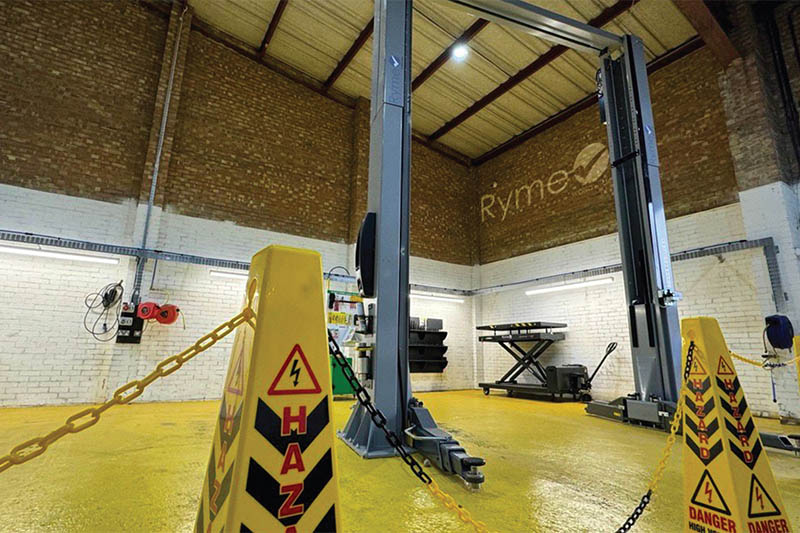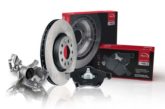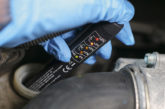
As electric vehicles continue to come down in price, and the Government holds firm on its dedication to an ICE phase out, we hear from garage equipment supplier Ryme on what practical measures workshops can put in place now to stay ahead of the opportunities presented by vehicle electrification.
As the automotive industry evolves at an unprecedented pace, traditional vehicle workshops are finding themselves on the back foot. Earlier this year, Tesla outsold Audi, a wake-up call that signalled just how swiftly the industry is shifting. What’s more, companies that once weren’t even considered a threat by major manufacturers are now making significant strides. A case in point: the Chinese automaker BYD, which reported an astonishing 1.21 million car sales in 2024.
For many, this surge in electric vehicle sales is a sign of a booming a market that can only help businesses. But here’s the catch: this growth in electric vehicles doesn’t mean success for all. The key factor that will determine whether you can capitalise on the electric revolution is simple: are you equipped for it?
Visiting a wide array of workshops on a regular basis, one thing is strikingly clear – there is a glaring lack of facilities for electric vehicles. This isn’t a problem today, as combustion engine vehicles still dominate the market. However, with the government’s pledge to ban the sale of new petrol and diesel cars by 2030, this could soon change. The question is: are you prepared for that shift?
Out of reach?
There’s a prevailing sentiment that electric vehicles are too expensive for the average person to afford. However, this is not entirely the case. Companies like BYD and Singer are bringing affordable EV options to market, with new models priced between £22,000 and £35,000. These price points are making EVs more accessible to the everyday consumer, driving a significant increase in sales.
While this surge in sales makes sense from a consumer perspective, there’s another crucial aspect of EV adoption that’s rarely discussed: maintenance. Unlike traditional combustion vehicles, EVs require specialist technicians for maintenance and repairs. For many independent garages, this presents a golden opportunity. With the right equipment and training, you can tap into a market that’s poised for rapid growth. However, the question remains: for how long will these elevated labour rates be sustainable? Will customers continue to accept the higher rates that come with specialised EV repairs as the market matures?
These questions are vital because they highlight why now is the time to invest in the equipment necessary to futureproof your business. As the electric age takes hold in the automotive industry, businesses that wait too long to adapt could find themselves priced out of the market.
The essential EV bay: A smart investment
Currently, the setup for an EV bay is relatively simple. At a minimum, you’ll need a lift, a battery removal table (which can double as an engine/transmission removal table), and a dedicated EV toolkit along with appropriate signage, PPE, and training. These basic components allow workshops to safely and efficiently work on electric vehicles.
That’s no small investment, but here’s the kicker: These types of bays could generate a return on investment in as little as 15 days. That’s a pretty compelling case for why now is the time to invest. With the current labour rates and the increasing demand for EV specialists, the question shifts from “is it worth it?” to “can I afford not to?”
As we move toward 2030 and beyond, the ability to service electric vehicles will become increasingly crucial for workshops of all sizes. Independent garages are the lifeblood of the UK’s automotive landscape, and in order to continue thriving, you’ll need to be ready for the inevitable electric shift.
Technicians: Training for the future
Equipping your workshop with the necessary tools is only half the battle. To truly capitalise on the EV revolution, you must also ensure that your technicians are prepared to handle the unique challenges of electric vehicles. Now is the perfect time to invest in EV-specific training for your team.
Specialist training in areas such as high voltage safety, battery management, and electrical systems diagnostics will become essential for the day-to-day operations of most modern workshops. Independent garages that are able to offer these services will be in high demand as more and more electric vehicles hit the roads.
As EV technology continues to evolve, it’s critical to stay ahead of the curve. Having technicians who are well-versed in the nuances of electric vehicles will set your workshop apart from the competition. The future of the industry is electric, and your technicians must be ready to meet the challenge.
Why now is the time to act
It’s clear that electric vehicles are not just a passing trend – they are the future of the automotive industry. The government’s 2030 ban on new combustion engine vehicles will drive the transition, and the market is already moving in that direction. Manufacturers like BYD, Tesla, and others are already outpacing traditional brands, and consumers are increasingly choosing electric vehicles for their affordability and eco-friendly benefits.
While hydrogen may be on the horizon, it still has a long way to go in terms of both infrastructure and market adoption. Electric vehicles, on the other hand, are here now, and they are only going to become more prevalent. Independent garages need to start preparing for this shift now, before the market prices them out of the industry.
Whether it’s investing in an EV bay or sending your technicians to training, the time to act is now. The transition to electric vehicles is already underway, and those who fail to adapt could find themselves left behind. With the right tools, training, and foresight, independent garages can not only survive the transition to electric but thrive in it.
The question isn’t whether electric vehicles will take over – it’s when. And when that time comes, will your workshop be ready? If not, you may find yourself asking not just if it’s worth the investment, but whether you can afford not to make it. The future is electric, and the future is now.









